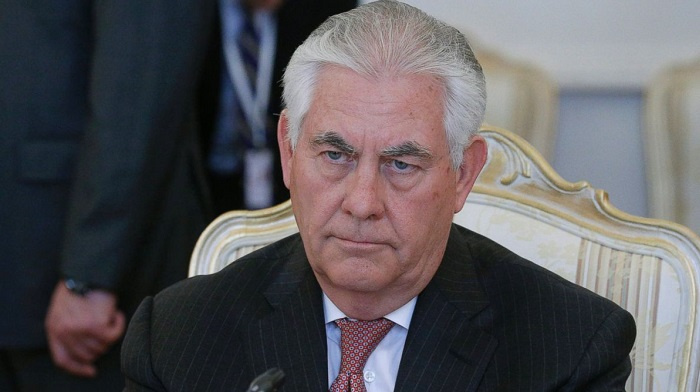The Trouble with Tillerson: Unbounded Iranophobia

In recent days, US Secretary of State Rex Tillerson has dropped all diplomatic niceties by adopting an unreconstructed, misleading, and certainly counter-productive language against Iran, wrapped around the Trump administration's certificate of Iran's compliance with the nuclear deal. Thus, in both his letter to US Congress as well as his press statement on April 19, Tillerson steamed full force in demonizing Iran and falsely attributing the worst possible vices to Iran. From attacking the nuclear deal as a failure in deterring Iran's nuclear ambition, to depicting Iran as an exporter of terror and violence in the region and beyond, to portraying Iran's domestic scene in the darkest language possible, Tillerson's full fury against Iran knows no bound and quite despairing for those who had hoped for a voice of reason by Tillerson in Trump's extremist universe. The United States' Secretary of State has now fully reconciled himself with the hawkish members of the administration, who are overjoyed at US's recent recourse to hard power in Syria, Yemen, and Afghanistan, not to overlook North Korea.
But, after having issued empty threats to North Korea and embarrassingly making a U-turn on Trump's public boast of dispatching a "powerful armada" toward North Korea, the White House is desperately looking to de-escalate, in part by shifting focus on Iran and thus deflecting attentions on another target. At the same time, swallowing the arsenic of its own poisonous language on the nuclear deal, the administration has essentially taken away with one hand what it has offered with the other hand, namely, respect for the nuclear deal and abiding with its terms and obligations. Clearly, Tillerson is now trying to obfuscate the issues to justify the impending Iran legislation in Congress and the major stab at the nuclear deal which will almost certainly follow when and if the new sanctions bills are enacted, re-introducing some of the sanctions lifted under the nuclear deal.
No wonder, then, that although Tillerson has announced a "review period" for the nuclear deal, the present attacks on the deal signify a major offensive against it, which runs contrary to the attitude of Europeans and others, who praise the agreement and have vowed to stick with it. Even Mr. Tillerson himself signed to a recent G-7 statement on the nuclear deal that characterizes it as a non-proliferation plus. Yet, excelling in the art of self-reversal without raising an eyebrow, Tillerson has now pretty much condemned the deal with his incendiary rhetoric that is a throwback to Bush's "axis of evil," in other words, a giant leap backward. Should this pattern of policy continue, the end result will be outsourcing the administration's Iran policy in the hands of hawkish members of Congress, who are on record adamantly opposing the nuclear deal from the outset. Of course, this does not bode well for the administration and its foreign policy, which was supposed to be about re-entrenchment and non-intervention, now quickly forgotten by the growing addiction of the new administration to hard power, in light of the deep cuts in the budget for US's diplomatic machinery.
A key problem with Tillerson's descent to the bosom of a new level of Iranophobia is that it stems from a fundamental misperception about Iran and the nature of Iran's external behavior. Suffice to say that contrary to Tillerson, Iran is working extra hard to bring peace to Syria, is a part of troika of Russia-Iran-Turkey sponsoring the on-going Astana peace talks, which have evolved as a subset of the Geneva process. In both Iraq and Syria, Iran is playing a major anti-terrorism role and it is a pity that Tillerson is unable to come to terms with the reality, instead, resorting to the unbounded vilification of Iran and a perverse logic of Iranophobia. This is a dysfunctional US foreign policy that has a high probability of greater and greater incoherence and self-contradiction, culminating in a policy quagmire on Iran and, indeed, the whole Middle East.
A big question now is how will the Trump administration deliver on its promise to defeat ISIS when it is focusing all its energy and venom against Iran and Syria? Fact is that the US has no effective anti-ISIS strategy and is now, in fact, providing indirect support for ISIS and other terrorist groups by targeting the regional states that are fighting those terrorists. George Orwell must be shivering in his grave now.

